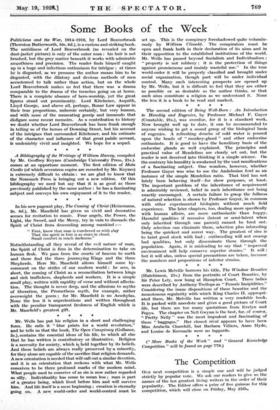The second edition of Being Well-Born : An Introduction to
Heredity and Eugenics, by Professor Michael F. Guyer (Constable, 21s.), was overdue, for it is a standard work. Now brought well up to date, it can be recommended to anyone wishing to get a sound grasp of the biological basis of eugenics. A refreshing douche of cold water is poured upon the heads of " monkey-gland " and other endocrine enthusiasts. It is good to have the hereditary basis of the endocrine glands so well explained. The principles and practical value of Mendelism are clearly set out, but the reader is not deceived into thinking it a simple science. On the contrary his humility is awakened by the vast ramifications of a fascinating subject. One wonders, however, whether Professor Guyer was wise to use the Andalusian fowl as an instance of the simple Mendelian ratio. That bird has not lately been behaving itself—for show purposes, at least. The important problem of the inheritance of acquirement is admirably reviewed, belief in such inheritance not being exactly encouraged. A certain failure to grasp the fullness of natural selection is shown by Professor Guyer, in common with other experimental biologists without muck field experience. The later chapters, too, dealing more specifically with human affairs, are more enthusiastic than happy. Harmful qualities if recessive (latent or semi-latent when only inherited through one parent) cannot be bred out. Only selection can eliminate them, selection plus inbreeding being the quickest and surest way. The greatest of sins is to taint good stock with bad ; outbreeding will not swamp bad qualities, but only disseminate them through the population. Again, it is misleading to say that " improved environment will help conserve superior strains." It will : but it will also, unless special precautions are taken, increase the numbers and proportions of inferior strains.
* * * *


































 Previous page
Previous page